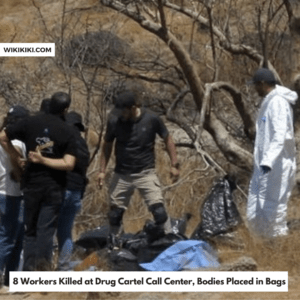Mexico’s drug cartel extends beyond the realm of drug trafficking, extortion, and kidnapping. Recent revelations have shed light on the sinister operations of call centers run by violent cartels, targeting Americans and Canadians in real estate scams. The shocking case of eight young workers who were confirmed dead after attempting to leave their jobs at a drug cartel-operated call center. As forensic experts identified the dismembered bodies, it became clear that the Jalisco New Generation cartel was behind this gruesome act, sending a chilling message to potential defectors.
Also Read: Chicago Shooting: 1 killed, 7 shot in Austin neighborhood

According to reports, as many as eight young workers were killed after they apparently tried to quit their jobs at a call center operated by the drug cartel. The call center was involved in a real estate scam targeting Americans. The bodies of the victims were found dismembered and placed in plastic bags. It is believed that the cartel killed the workers as a message to others who might consider leaving their ranks.
The Jalisco New Generation cartel is known for its violence and has expanded its criminal activities beyond drug trafficking to include extortion, kidnapping, and now operating call centers for fraudulent schemes. The drug cartel operates call centers that scam money from Americans and Canadians through fake offers to buy their timeshares.
Cases of violence and criminal activities involving drug cartels are not uncommon in Mexico. It is a serious issue that the Mexican government continues to grapple with, and efforts are being made to combat these criminal organizations and bring them to justice.
Tragic Case at Drug Cartel Call Center
The tragic case of the eight young workers who met a gruesome fate sheds light on the ruthless nature of the Jalisco cartel. Initially reported missing by their families, suspicions arose when body parts were discovered in plastic bags. Forensic examinations confirmed that the remains belonged to the missing call center workers. Investigations revealed that the call center, unbeknownst to the workers’ families, was actually operated by the Jalisco cartel.
Also Read: Senegal Violence: Deadly Clashes in Following Opposition Leader’s Sentencing
The motive behind their killings remains unclear, but it is believed that the victims were targeted after attempting to leave their jobs, illustrating the cartel’s zero-tolerance policy for defectors. This act of violence serves as a warning to others, emphasizing the cartel’s grip on power and its willingness to resort to extreme measures to maintain control.
The disappearance of individuals in Mexico, particularly in Jalisco, has reached alarming levels. Activist groups, such as “Por Amor a Ellxs” (For Love of Them), work tirelessly to advocate for the rights of the disappeared and their families. With an estimated 15,000 missing people in Jalisco alone, these groups seek justice and answers for their loved ones. Their efforts bring attention to the systemic issue of disappearances and the need for greater governmental action to address the crisis.
Cartel Call Centers
Drug cartel call centers, it is crucial to examine the evolution of the Jalisco New Generation cartel (CJNG) and its expansion beyond traditional criminal activities. Initially known for its dominance in drug trafficking, extortion, and kidnapping, CJNG has diversified its operations to include call centers aimed at defrauding unsuspecting Americans and Canadians.
Operating under the guise of legitimate businesses, these call centers offer fake offers to purchase timeshares, exploiting the vulnerability of individuals seeking to sell their properties. The CJNG’s involvement in timeshare fraud, particularly in popular tourist destinations like Puerto Vallarta, has become a lucrative revenue stream, further fueling their criminal empire.
Also Read: Tragic Shooting in Pennsylvania Claims Lives of 3, Including 2 Children
Call centers have emerged as significant sources of employment for young people and migrants in Mexico, especially those who have acquired English language skills during their time in the United States. However, the cartel-run call centers exploit the vulnerabilities of these individuals, trapping them in a web of criminal activity.
Workers are often lured by promises of stable jobs and decent wages, only to find themselves ensnared in illegal operations. The case of the eight young victims highlights the human cost of these exploitative practices, leaving families devastated and communities shaken.
The revelation of drug cartel-operated call centers and their involvement in timeshare fraud has prompted international law enforcement agencies to take action. The U.S. Treasury Department has imposed sanctions on key individuals and entities linked to the CJNG, targeting their financial networks. Additionally, Mexican authorities have increased efforts to dismantle cartel operations, recognizing the need to curb their expanding criminal enterprises. Collaborative efforts between Mexico, the United States, and other affected countries are crucial to tackling this multifaceted issue effectively.
The case of the drug cartel-operated call center and the tragic fate of eight young workers serves as a chilling reminder of the violence and exploitation perpetuated by Mexico’s drug cartels. Beyond drug trafficking, these criminal organizations have extended their reach to diverse criminal activities, including fraudulent call centers targeting unsuspecting individuals.
The story highlights the complex dynamics of the Jalisco New Generation cartel and their ruthless tactics to maintain control and intimidate potential defectors. It also underscores the need for continued efforts to combat cartels, dismantle their networks, and seek justice for the victims and their families.
Moreover, the case prompts a broader conversation about the challenges of employment exploitation and the vulnerability of marginalized communities to criminal enterprises. By addressing these underlying issues, societies can work toward preventing the proliferation of Drug cartel call centers and protecting individuals from falling victim to their scams.
Also Read: Rapper Fetty Wap Sentenced to 6 Years in Prison for Drug Trafficking

















+ There are no comments
Add yours